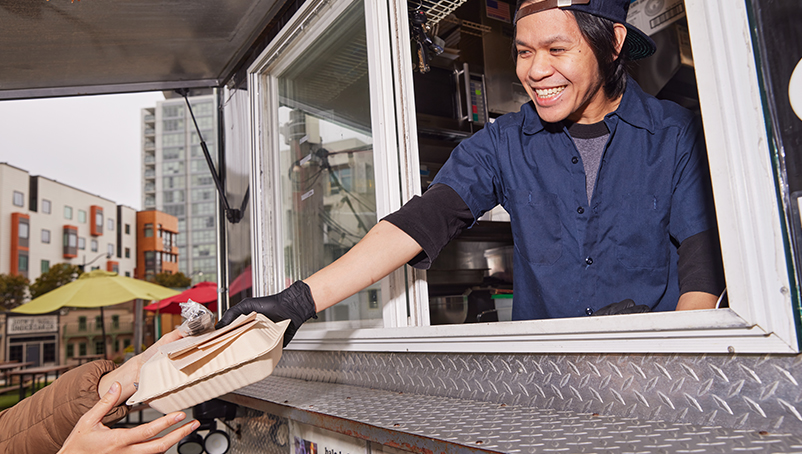Before exercising your right to refuse service, you and your employees should always try to de-escalate the situation. Keep these tips in mind:
- Don’t take it personally — even if a rude customer gets personal.
- Never mistake an unhappy customer for a rude customer.
- People say things online that they would never say in person.
- Practice empathizing statements like, “I understand your disappointment” and “I see why that’s frustrating for you.”
- Maintain eye contact and keep your body language open.
- If your customer has legitimate reasons for complaining, offer a sincere apology.
- If appropriate, ask the customer how they’d like you to resolve the problem.
It can also help to create a clear “customer conduct policy” and train your employees on how to enforce it consistently. Talk with your employees and co-owners about specific customer behaviors that will not be tolerated before a problem arises.
Sometimes, resolving conflict respectfully can turn a tense moment into a long-term customer relationship — it shows that you respect your customer and makes them feel valued. But in other cases, asking someone to leave may be the best way to protect your employees and your business.
So when exactly can you say “enough is enough”? Here are some situations where refusing service is generally legal.
Five common examples of when refusal is legal
Not all unequal treatment violates federal or state laws. Some refusals of service are legal when they’re based on behavior, safety or compliance issues — it’s not discrimination.
For example, it’s illegal discrimination is if you refuse service based on someone’s race, religion or other protected characteristic. This would violate federal civil rights laws.
However, it’s lawful to refuse service when customers violate neutral, clearly posted business rules — such as a restaurant’s dress code or health and safety standards. (Think “no shoes, no shirt, no service” signs you’ve seen.)
As a business owner, you don’t have the legal right to refuse service based on religion, skin color, sex, physical conditions not within the customer’s control or nationality. Doing so could expose you to legal action or fines.
Before refusing service, make sure your decision is based on behavior or policy — not personal preference or assumptions. Discriminatory or inconsistent enforcement could make you and your business vulnerable to complaints or lawsuits.
Here are five common examples of when refusing service is generally allowed:
- Health and safety violations: A customer brings their dog into your restaurant, which violates local health ordinances. Unless it’s a service animal protected under the ADA, you can legally refuse service.
- Threats or harassment: A customer threatens or verbally abuses you, your employee or other patrons. You can ask them to leave.
- After hours: If your business is closed and someone demands service, you’re not required to accommodate them.
- Disruptive behavior or intoxication: A customer is yelling, swearing, making a mess, or clearly intoxicated. You have the right to refuse service to maintain a safe environment.
- Violation of posted rules: When a customer breaks your establishment’s written or clearly communicated policies (that align with local, state and federal statutes), you can legally refuse service.
TIP: Post your rules and expectations — like “no shoes, no service” or “no outside food allowed” — where customers can see them. This helps prevent misunderstandings and shows that your policies apply equally to everyone.
Since every state handles these laws differently, here’s how protections vary across the country.
Which states have anti-discrimination laws?
Anti-discrimination protections can vary state by state. While federal law covers core protected classes, many states have added their own laws that extend protections to categories like sexual orientation, gender identity or marital status.
Here’s how states differ in their approach:
| States that protect everyone from discrimination | States that offer discrimination protections through city or county laws | States that restrict local governments from expanding protections |
| California
Colorado
Connecticut
Delaware
District of Columbia
Hawaii
Illinois
Iowa
Maine
Maryland
Massachusetts
Minnesota
Nevada
New Hampshire
New Jersey
New Mexico
New York
Oregon
Rhode Island
Vermont
Virginia
Washington | Alabama
Alaska
Arizona
Florida
Georgia
Idaho
Indiana
Kansas
Kentucky
Louisiana
Michigan
Mississippi
Missouri
Montana
Nebraska
North Carolina
North Dakota
Ohio
Oklahoma
Pennsylvania
South Carolina
South Dakota
Texas
Utah
West Virginia
Wisconsin
Wyoming | Arkansas
Tennessee |
For example, in Colorado a court ruled that refusing service based on sexual orientation violated that state’s law. And in Indiana, a religious-freedom law generated concern when it was first passed — but a follow-up clarification made clear that service providers could not rely on it to refuse service based on gender identity.
And in Kentucky, a 2025 ruling fined a restaurant $25,000 for refusing service to a Navy veteran accompanied by a service dog. The state’s Human Rights Commission found that denying entry violated disability-protection laws under both state and federal regulations — an example of when refusal of service based on disability is unlawful.
TIP: Cases like this show how quickly rules can change — and how costly it can be when business owners don’t understand local or state laws. Even if you believe you’re acting within your rights, what’s legal in one state or city might not be in another. Taking time to review your area’s public-accommodation and anti-discrimination laws can help protect your business from expensive fines or complaints.







